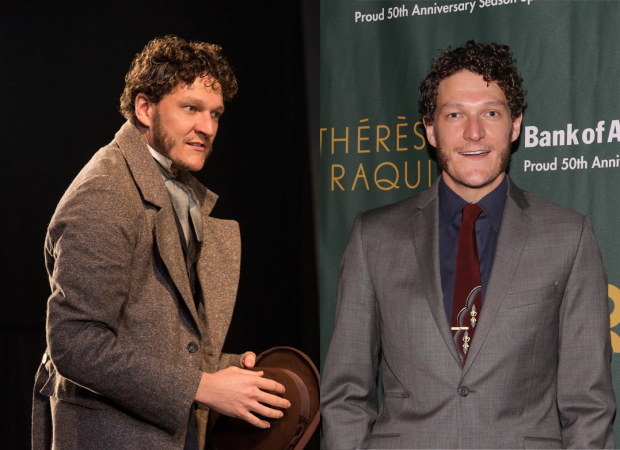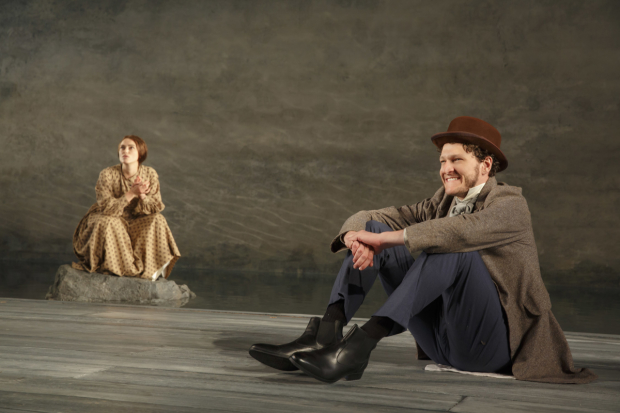Final Bow: Thérèse Raquin's Gabriel Ebert on Acting Indifferent to His Beautiful Costars
Ebert reflects on not getting to treat Keira Knightly and Judith Light like “the goddesses that they are.”
In Broadway's Thérèse Raquin, Gabriel Ebert plays Camille, Thérèse's (at best indifferent) husband. As such, Ebert is faced with a gargantuan task: acting as though he has no interest in the beautiful and elegant Keira Knightly, who is making her Broadway debut as the play's title character. And it doesn't end there. Ebert also plays son to beloved stage and screen star Judith Light (Madame Raquin), whom he treats with dismissive distain. Fortunately, Ebert, a seasoned actor with four previous Broadway credits under his belt, is up to the task.
Before the run of Thérèse Raquin ends on January 3, TheaterMania reached out to Ebert to ask him about overcoming the urge to be nice, navigating the play's many surprises, and pronouncing the most mispronounced title on Broadway.

(© Joan Marcus/David Gordon)
1. What is your favorite line that you deliver?
It probably has to be, "I am in the mood for action!"
2. Everyone loves inside jokes. What is the best one from your show?
The best inside joke from our show revolves around the fact that no one can pronounce the name of our play. I've never seen anything like it. I have heard a thousand different mispronunciations. We've come up with some versions of our own as well, of course: Tourette's Raquin in which Therese shouts obscenities or Therese Raccoon, which basically explains itself.
3. Every show experiences technical difficulties. What was the worst technical difficulty experienced during your show and how was it handled?
The most disruptive event in our show wasn't a technical glitch but an over-zealous Keira Knightley enthusiast who began shouting at her from the mezzanine during the very first minute of our very first preview. It was only Keira and I onstage at the time, and we tried our best to carry on with the scene until it became clear that this man was unwell and that he wasn't going to stop. It culminated in him throwing a bouquet of roses onto the stage which I promptly kicked into the wings, gave him a mean dead-eye stare, and then Keira and I left the stage. We held for about 10 minutes as they arrested the man and took him away. Then we got back to work. [It was] an eerie reminder of how vulnerable we are on the stage, and how tenuous the unspoken contract between performer and audience is. God bless Keira though, because she was the coolest of all of us after the incident.
4. What was the most "interesting" present someone gave you at the stage door?
If you want to talk to someone about interesting stage door presents, talk to Judith Light. This woman gets more flowers, more love, more cards and entreaties than anyone I have ever worked with. And of course, she writes back to every single one, and obliges their every request. What a woman!
5. Who is the coolest person who came to see your show? (You can't say family!)
There have been a lot of starry people who have come and seen this show, but I was particularly excited to meet Jeffrey Tambor, who is starring on Transparent opposite Judith Light. I have been a huge fan of his work for years, and he was such a kind and sweet man when I got to meet him, it was really a thrill. The love and respect that he and Judith have for each other is so beautiful.
6. What was your first thought when you were told you would have to jump into an onstage river?
I was, and have continued to be, thrilled about our incredible onstage river. How often do you get the opportunity to have a full swim on a Broadway stage? I think that it is such a beautiful piece of design by our brilliant set designer Beowulf Boritt, and getting thrown into it is certainly one of the coolest things that I have ever gotten to do in a theater. I think that it takes our play to a different level and genuinely surprises the audience.
7. How do you spend Act Two?
Although it may seem like I'm just farting around backstage during Act Two of our play, I do actually occupy myself with some important tasks. Firstly, all of the scratching of the walls and the shrieking of "Thérèse" is done live by me. I fought to do the sound cues live. We had recordings of my voice that were being piped in, but they lacked immediacy. I thought that if I could try to genuinely frighten Matt and Keira by scratching on the walls or by doing something unpredictable, then I'd actually be accomplishing something as the ghost. The rest of the time, I strum on my ukulele, truth be told. And no, that's not a euphemism.
8. Is it difficult to act indifferent to Keira Knightley?
It is a bit of a shame to be on a stage with two women as beautiful and glorious as Keira Knightley and Judith Light, and to totally treat them with disregard and disdain — but that's my job. I spent time in the rehearsal room trying to find times to be nice or loving, but it got in the way of the play, in the way of allowing Keira to get to the place where she can decide to murder me. I hope that I get an opportunity to work with them again someday so that I can treat them both like the goddesses that they are, but for now the best help that I can give is by playing my character as truthfully as I can muster. Sadly, that involves treating them both rather badly. Hopefully I make up for it backstage by being a good company member and collaborator.
9. If you get to keep the portrait of yourself, where will you put it?
I do hope that I get to keep that portrait! What a gem! Like a real New York actor I'll have to answer the question "where will I put it?" in the only way that I can: I live in a one-room studio. I'm going to put it somewhere in that room.
10. You seem to move effortlessly between musicals and straight plays. What do you get out of each?
I have been very fortunate to be able to do a wide array of different types of shows. Whether I'm working on a musical or a straight play, my main concern is the quality of the material, the quality of the challenge that I am being presented with. I try to tackle the things that I find the scariest, the most difficult, in the hopes that I might learn something new and perhaps surprise myself, and maybe even the audience, with what I'm capable of. Whether they are musicals or straight plays is not as important to me as is the quality of the story that we are telling, and the quality of our telling of that story — that would have all sounded so much better if it was set to music.

(© Joan Marcus)










